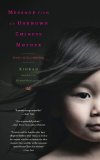Summary | Excerpt | Reviews | Beyond the Book | Readalikes | Genres & Themes | Author Bio

Stories of Loss and Love
by Xue Xinran
In developing countries, with their communities that rely on primitive methods of farming, or on hunting, gathering, and fishing, hard manual labor is survival; so a preference for boys is inevitable. Males have an indisputable physical advantage over females when it comes to laboring, carrying goods, hunting, and defense. Another factor that cannot be ignored in China is an ancient system of land distribution that still persists today. It began with the Xia dynasty (approximately 2070 BC to 1600 BC), and found its most complete form in the Well Field System of the Zhou dynasty (1045 BC to 256 BC), and the Equal Field System set up around AD 485 by the Northern Wei rulers. What these had in common with the present system is the principle of allocating fields based on the number of household members. Discrimination in favor of men became, therefore, an immutable law. In AD 485 a list was drawn up of households, and then land was allocated based on the number of permanent household members. Land was divided into two kinds: arable fields, for growing grain, and mulberry tree land, for feeding the silkworms. Every male aged fifteen years or more received 40 mu of arable land, while females received 20 mu, and slaves and servants could also be allocated land. This land reverted to the government on death. As for mulberry tree land, males received 20 mu, and this became their property - they could buy and sell it and it did not need to be handed back to the government. During the Tang dynasty, AD 618 to 907, it was clearly stipulated that females were not normally to be given their own land. And so dynasties have come and gone through Chinese history, but the ways in which land is apportioned have never really changed, and the basic inequality between men and women has became a deeply entrenched tradition. In the villages, boy children not only carried on the family line and inherited the clan name, they were the source of the family property and the creators of its wealth.
Article 22 of the Population and Family Planning Law of the People's Republic of China, promulgated on December 29, 2001, says: "Discrimination against and maltreatment of women who give birth to baby girls or who suffer from infertility are prohibited. Discrimination against, maltreatment, and abandonment of baby girls are prohibited." However, a "good woman" must give birth to a boy - every married village woman knows this. It is both her god-given duty and her parents-in-law's most fervent hope. So in some poorer villages, if the first child is a girl, the unfortunate child is abandoned or even smothered at birth. Where birth control is not properly understood, abandoning infants is just another law of nature that has operated from time immemorial. If the extra infant the family could not bring up was a boy, he would often be adopted by another family or sold. For a girl, death was almost inevitable.
China's one-child-per-family policy was drawn up at the Second National Symposium on Population held in the city of Chengdu, Sichuan province, on December 11–14, 1979. The then vice premier Chen Muhua (who also happened to be the first woman premier in China's history) convinced delegates in the closing debate that limiting couples to one child could slow the rapid rate of population growth in China. That was the start of the "population revolution," which remains the subject of fierce debate to this day. The renowned Chinese specialist in population studies Professor Ma Yanchu* had warned in the early 1950s that the country's population was growing too fast; at his suggestion, the government carried out China's first population survey in the early part of 1953. The results were published on November 1 of that year: at midnight on June 1, 1953, the Chinese population stood at 600 million. In just four years since the establishment of the People's Republic of China in 1949, the population had grown by 100 million.
Excerpted from Message from an Unknown Chinese Mother by Xue Xinran. Copyright © 2011 by Xue Xinran. Excerpted by permission of Scribner. All rights reserved. No part of this excerpt may be reproduced or reprinted without permission in writing from the publisher.
Some books are to be tasted, others to be swallowed, and some to be chewed on and digested.
Click Here to find out who said this, as well as discovering other famous literary quotes!
Your guide toexceptional books
BookBrowse seeks out and recommends the best in contemporary fiction and nonfiction—books that not only engage and entertain but also deepen our understanding of ourselves and the world around us.